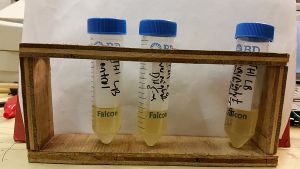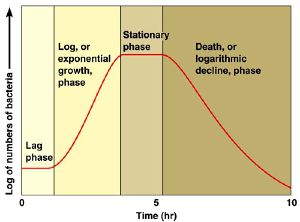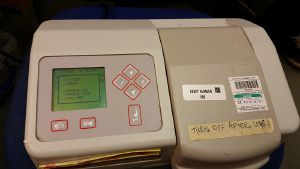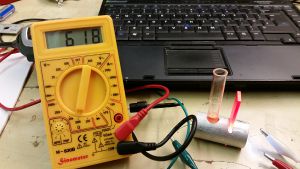Difference between revisions of "Project:OD600 Measurement"
m (Tolland moved page Project:OD600 to Project:OD600 Measurement) |
m |
||
| Line 1: | Line 1: | ||
| − | In the molecular biology of bacteria, OD600 is often used to estimate the current growth phase of a bacteria or other cells in suspension. It means the "optical density of the sample to light of 600nm". The measured OD600 gives an estimate of the concentration of the cells in the liquid, which can be used to estimate the growth phase of the population. 600nm is in the visible wavelength an is approximately orange. | + | In the molecular biology of bacteria, OD600 is often used to estimate the current growth phase of a bacteria or other cells in suspension. It means the "optical density of the sample to light of 600nm". The measured OD600 of the sample relative to a plain reference sample, gives an estimate of the concentration of the cells in the liquid, which can be used to estimate the growth phase of the population. 600nm is in the visible wavelength an is approximately orange. |
The basic idea is to take a sample of plain media, and a sample of media in which bacteria has been growing. Initially the levels of bacteria will be very low, and the amount of light absorbed by the 2 samples will be similar. | The basic idea is to take a sample of plain media, and a sample of media in which bacteria has been growing. Initially the levels of bacteria will be very low, and the amount of light absorbed by the 2 samples will be similar. | ||
| + | |||
| + | [[File:File:OD600-pictore.png|500px]] | ||
[[File:14853028140 6a23c3757f k.jpg|300px]] | [[File:14853028140 6a23c3757f k.jpg|300px]] | ||
Revision as of 03:45, 1 February 2015
In the molecular biology of bacteria, OD600 is often used to estimate the current growth phase of a bacteria or other cells in suspension. It means the "optical density of the sample to light of 600nm". The measured OD600 of the sample relative to a plain reference sample, gives an estimate of the concentration of the cells in the liquid, which can be used to estimate the growth phase of the population. 600nm is in the visible wavelength an is approximately orange.
The basic idea is to take a sample of plain media, and a sample of media in which bacteria has been growing. Initially the levels of bacteria will be very low, and the amount of light absorbed by the 2 samples will be similar.

(Image: http://kids.britannica.com/comptons/art-57434/When-white-light-is-spread-apart-by-a-prism-or)
The procedure is normally carried out using a visible light capable spectrophotometer like this one;
The idea is to make a cheap, robust, reliable alternative to a dedicated and expensive device. The initial brain storming is to take a 600 nm source, (or a broad wavelength source of light which includes 600 nm and use a BP filter) and a level detector, and calibrate it to match 0.4 at OD600 on a proper spectrophotometer..
The initial attempt was to use a white led with a filter for something approximating 600nm
At the moment the main issue is that the LDR (light dependent resistor) only sees about 20 ohms of difference between the initial inoculation and the mid-log phase, which shows as 0.4 OD600 on a spectrophotometer.
If you don't have access to a spectrophotometer, (or even if you do), this should be a convenient way to estimate OD600 values for your sample
A secondary project is to cast some 12mm x 12mm resin blocks to be used for calibration against a system that takes a cuvette.
Here is a document describing various methods for calibrating spectrophotometers;
http://www.perkinelmer.co.uk/CMSResources/Images/44-136839TCH_Validating_UV_Visible.pdf
alternative ideas
use a stain that binds to a protein that is only expressed during exponential growth phase
DNA Pol II is only expressed during the stationary period of growth, and so might be used as a marker for the end of exponential growth
omp regulates response to osmolarity is expressed in postexponential phase; (Connell et al 1987)
references
What you need to know about OD600 http://bitesizebio.com/1005/what-you-need-to-know-about-od600/
http://www.researchgate.net/post/How_to_exactly_determine_the_OD600_of_Ecoli_suspension





